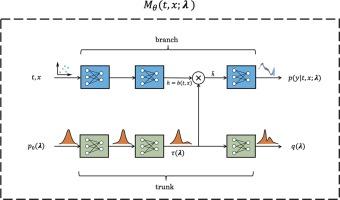pde中贝叶斯参数估计的深度算子网络
IF 3.4
2区 物理与天体物理
Q1 COMPUTER SCIENCE, INTERDISCIPLINARY APPLICATIONS
引用次数: 0
摘要
我们提出了一种结合深度算子网络(DeepONets)和物理信息神经网络(pinn)的新框架,用于求解偏微分方程(PDEs),同时估计其未知参数。通过将数据驱动的学习与物理约束相结合,我们的方法在不同的场景中实现了鲁棒和准确的解决方案。贝叶斯训练通过变分推理实现,允许对数据和模型的不确定性进行全面的不确定性量化。这确保了可靠的预测和参数估计,即使在嘈杂的条件下或当一些控制问题的物理方程缺失时。该框架在求解一维非定常热方程、二维反应扩散方程、三维特征值问题以及具有稀疏、噪声观测值的各种回归任务等正解和反解问题中显示出其有效性。该方法为解决PDE代理模型中的不确定性量化问题提供了一种计算效率高、可推广的方法。本文章由计算机程序翻译,如有差异,请以英文原文为准。

Deep operator networks for Bayesian parameter estimation in PDEs
We present a novel framework combining Deep Operator Networks (DeepONets) with Physics-Informed Neural Networks (PINNs) to solve partial differential equations (PDEs) while estimating their unknown parameters. By integrating data-driven learning with physical constraints, our method achieves robust and accurate solutions across diverse scenarios. Bayesian training is implemented through variational inference, allowing for comprehensive uncertainty quantification for both data and model uncertainties. This ensures reliable prediction and parameter estimates even in noisy conditions or when some of the physical equations governing the problem are missing. The framework demonstrates its efficacy in solving forward and inverse problems, including the 1D unsteady heat equation, 2D reaction-diffusion equations, 3D eigenvalue problem, and various regression tasks with sparse, noisy observations. This approach provides a computationally efficient and generalizable method for addressing uncertainty quantification in PDE surrogate modeling.
求助全文
通过发布文献求助,成功后即可免费获取论文全文。
去求助
来源期刊

Computer Physics Communications
物理-计算机:跨学科应用
CiteScore
12.10
自引率
3.20%
发文量
287
审稿时长
5.3 months
期刊介绍:
The focus of CPC is on contemporary computational methods and techniques and their implementation, the effectiveness of which will normally be evidenced by the author(s) within the context of a substantive problem in physics. Within this setting CPC publishes two types of paper.
Computer Programs in Physics (CPiP)
These papers describe significant computer programs to be archived in the CPC Program Library which is held in the Mendeley Data repository. The submitted software must be covered by an approved open source licence. Papers and associated computer programs that address a problem of contemporary interest in physics that cannot be solved by current software are particularly encouraged.
Computational Physics Papers (CP)
These are research papers in, but are not limited to, the following themes across computational physics and related disciplines.
mathematical and numerical methods and algorithms;
computational models including those associated with the design, control and analysis of experiments; and
algebraic computation.
Each will normally include software implementation and performance details. The software implementation should, ideally, be available via GitHub, Zenodo or an institutional repository.In addition, research papers on the impact of advanced computer architecture and special purpose computers on computing in the physical sciences and software topics related to, and of importance in, the physical sciences may be considered.
 求助内容:
求助内容: 应助结果提醒方式:
应助结果提醒方式:


